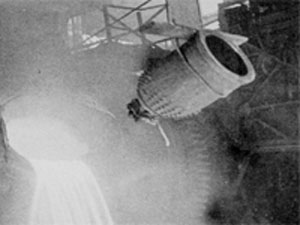Listening Post: Melting down a poem

A temple bell goes to the furnace.
I heard the church bells ringing Sunday morning and a picture from World War Two came to mind. I can’t locate it anymore, but it showed a procession of Japanese monks accompanying their temple bell down to a shipyard, where it was to be melted down for armaments. As a “beating plowshares into swords” kind of switcheroo, it seemed a good topic for an end of Poetry Month Sunday poem.
I turned to Google, as I often do when looking for poetry ingredients, and soon found that the histories of bells and cannon were intertwined back to the beginning. Chinese bells, it seems, were the first cannon, the only mass of metal strong enough to focus the energy of the gunpowder newly discovered by Chinese alchemists. Foundry workers soon specialized their techniques, more efficient cannon shapes were found, and the technologies diverged.
But ever since, whenever metal was scarce in wartime, church and other bells have been melted and recast into weaponry. During the American Revolution, when the British were approaching Philadelphia, it wasn’t just the Congress that evacuated; the bells of the city, including the Liberty Bell, were also removed and concealed beneath a church floor to save them from the enemy furnace. During the Civil War, Confederate General Beauregard put out the call for bells to be melted down. A popular patriotic poem, “Melt the Bells,” was published in a Memphis newspaper. When a New Orleans foundry was captured during the war, a large stock of bells was on hand. It was notable that southern-made bells were few. The preferred “cannon fodder” were mostly cast in Union foundries.
At this point my research took a turn, as I discovered the equally-rich history of melting cannon down to make bells. For the Columbian Exposition in 1876, a replica of the Liberty Bell was cast, and accompanying it, a sculpture of a plow, cast from weapons. A great bell in the Cologne Cathedral was cast from French cannon captured during the Franco-Prussian War. Ironically, it was melted down in 1918 to be made into weapons for World War One.
In Peace Bell Park in South Korea is a massive bell cast from weapons around the world. There is also a bell for the divided nations of North and South Korea. It is made of wood and can’t be tolled, but it can’t be melted down into weapons either. Closer to home is the Berkley Peace Bell, cast from handguns and other weapons confiscated by Bay Area police departments.
Although my notion for a poem has been melted down and recast as this post, a new poem may arise from it–maybe on the infinite mutability of metal and spirit–how any shape, for good or ill, can be founded in the furnace of the heart.
Tags: listeningpost








An observation, with apologies to John Dryden and Alexander Pope and their like, on Dale’s essay comment: “When a New Orleans foundry was captured during the war, a large stock of bells was on hand. It was notable that southern-made bells were few. The preferred “cannon fodder” were mostly cast in Union foundries.”
The Land of Dixie and its Southern “Belles”
Were famed for beauty, so the folklore tells.
But long ago, when fought the Blue and Grey
The Southern “bells” from churches stashed away
Survived the War, then pealed anew their chimes
When to all States returned more peaceful times.
And Great Columbia, through Union iron victorious
Casting new bells, proclaimed an era glorious!
Thanks Paul. I knew someone would get a poem out of this.
As a former director of handbell choirs and relative of several veterans who has pastored several churches, I found your reflections most illuminating on various levels, Dale. Thank you for this thought-provoking piece.